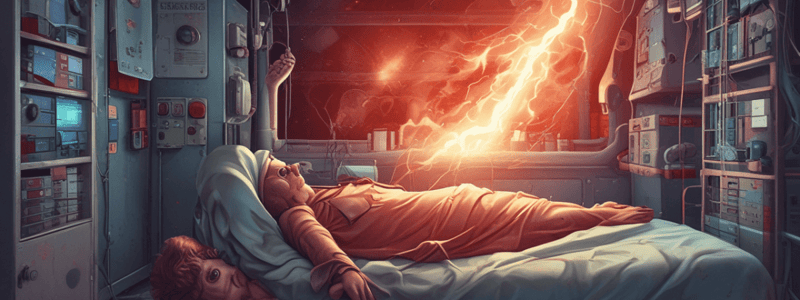Podcast
Questions and Answers
What is the most common cause of shock?
What is the most common cause of shock?
- Acute allergic reactions
- Inadequate blood volume from hemorrhagic and non-hemorrhagic causes (correct)
- Excessive sweating
- Nervous system damage
Which type of shock is caused by inadequate heart function?
Which type of shock is caused by inadequate heart function?
- Septic shock
- Cardiogenic shock (correct)
- Distributive shock
- Obstructive shock
What are the early signs and symptoms of shock?
What are the early signs and symptoms of shock?
- Paleness, cool/clammy skin, and increased heart rate (correct)
- Fever, excessive sweating, and diabetes insipidus
- Anxiety, thirst, and worsening symptoms
- Restlessness, vomiting, and nausea
Which type of shock is associated with vessel damage?
Which type of shock is associated with vessel damage?
In what stage of shock does blood pressure start to fall?
In what stage of shock does blood pressure start to fall?
Which condition is NOT a non-hemorrhagic cause of shock?
Which condition is NOT a non-hemorrhagic cause of shock?
Study Notes
- Shock can be caused by various factors such as bleeding, respiratory failure, acute allergic reactions, overwhelming infection, severe fractures, abdominal or chest injuries, spinal injuries, severe infection, major heart attack, and anaphylaxis.
- The most common cause of shock is hypovolemia from blood or fluid loss, but there are different types of shocks including hypovolemic shock due to inadequate blood volume from hemorrhagic and non-hemorrhagic causes.
- Non-hemorrhagic causes of shock include abnormal losses of fluids and electrolytes like dehydration from GI losses, fever, hyperventilation, excessive sweating, plasma losses from burns, drains, and wounds, diabetes insipidus, and osmotic diuresis.
- Early signs and symptoms of shock include restlessness, anxiety, thirst, nausea, vomiting, paleness, cool/clammy skin, increased heart rate, falling blood pressure, and worsening symptoms as the condition progresses.
- Different types of shock include cardiogenic shock caused by inadequate heart function, obstructive shock from mechanical obstruction affecting pump function, distributive shock like septic shock causing vessel damage, neurogenic shock from nervous system damage, and anaphylactic shock from severe allergic reactions.
- Shock progresses through stages of compensated (early stage), decompensated (blood pressure falls), and irreversible (terminal stage) with specific signs and symptoms for each stage.
- Treatment for shock involves controlling bleeding, maintaining body heat, providing IV fluids, administering medications like epinephrine for anaphylactic shock, and rapid transport to a medical facility for further management.
Studying That Suits You
Use AI to generate personalized quizzes and flashcards to suit your learning preferences.
Description
Learn about the causes, types, and treatment of shock, including hypovolemic shock, cardiogenic shock, obstructive shock, distributive shock, neurogenic shock, and anaphylactic shock. Explore the stages of shock progression and the signs and symptoms associated with each stage.



